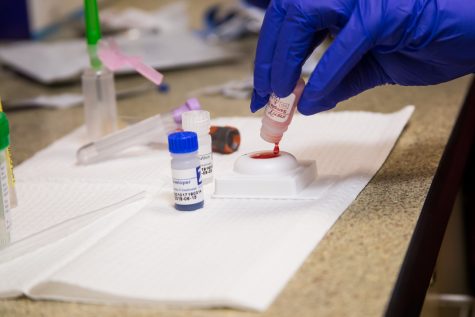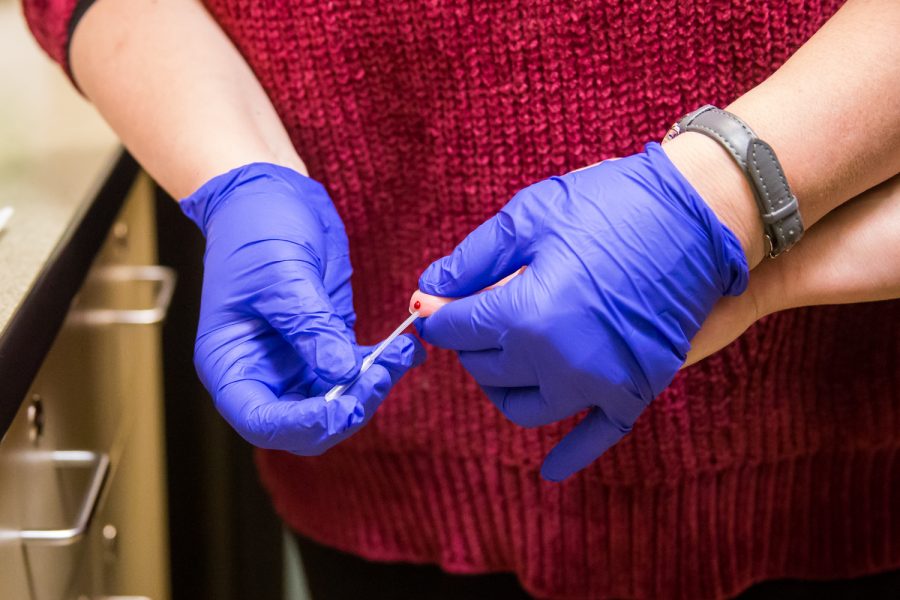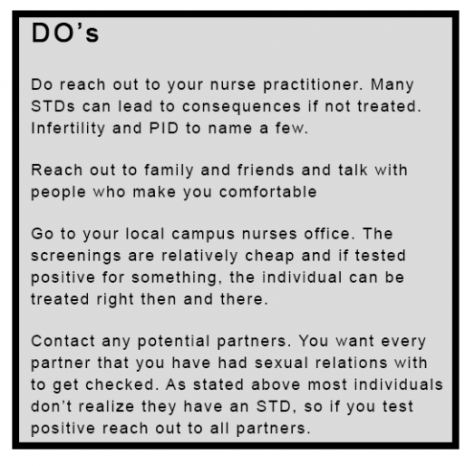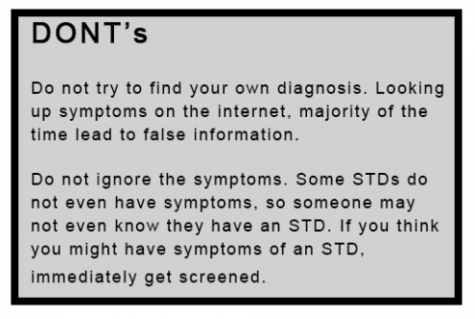STDs: A common student issue
February 21, 2019
When most people hear the term “sexually transmitted infection,” or STI, they don’t realize that an STI is another word for the more colloquial sexually transmitted disease, or STD. Some may be intimidated by the term “STD”; students don’t know how to respond when they believe they might have an infection.
The CDC estimates that youth ages 15-24 make up just over one quarter of the sexually active population, but account for half of the 20 million new sexually transmitted infections that occur in the United States each year. With the amount of resources available, there are a variety of tools that can assist all individuals when they have had unprotected sex.
There are a handful of different STDs that are out there today. The complete list consists of: bacterial vaginosis, chlamydia, genital warts, gonorrhea, herpes, HIV, human papillomavirus (HPV), pelvic inflammatory disease, syphilis and trichomoniasis.
Local resources
With the amount of resources available to the public, people should not be worried. One in particular is going to the local health clinic. Within the Northern Kentucky area, there are four counties, Boone, Campbell, Grant and Kenton. Each county has a health clinic, which can assist the public in many ways.

“In looking at the most prevalent STDs that are out there, chlamydia is number one. So you have chlamydia is at a high rate, gonorrhea is high rate, you have syphilis, also herpes,” said nursing professor Jennifer Hunter, who also worked as president of clinical nursing at the Northern Kentucky Health Department for 28 years.
One of the best ways to know if someone has an STD is to get a screening. According to nkyhealth.org, in a typical STD screening, a patient will be screened through a blood test and physical examination for chlamydia, gonorrhea, hepatitis C, HIV, syphilis, trichomoniasis and herpes.
Campus resources
The best on-campus resource for identifying and treating an STD is Health, Counseling & Student Wellness. Here, students and faculty can get a screening, as well as speak with a nurse practitioner. Simply talking with a nurse is one of the best ways to help calm nerves and educate oneself.
The student Health and Wellness Center is not just a place students and faculty go to get treated for an illness. The center is a place where individuals can feel safe and welcomed in a judgement-free zone.
People tend to be scared when it comes to such a sensitive topic. In this type of situation, no one should feel embarrassed, uncomfortable or awkward. These diseases are common amongst teens and individuals in their early twenties.
“I think embarrassment is just one reason why people are afraid to get tested,” NKU senior Seth Stone said. “Also with men I think it’s a pain aspect because it’s not a very pleasant procedure for us. So I think pain and embarrassment are two big reasons.”
Paying for a screening can sometimes be challenging. Many people within the area aren’t able to pay for certain procedures or screenings. Making payments are hard when you are unsure of how much they cost. According to Rose Tempel, “Many students within the area aren’t able to pay for screenings, so we have options to help.”
“With the different locations of the clinics and the hours, open Monday-Friday. They will not refuse to screen you if you don’t have the inability to pay,” Hunter said.
At the NKY Health clinic, STD screenings are free. If a person has tested positive for an STD, they can be treated by the nurse practitioner. If you visit HCSW on campus, there is free HIV and hepatitis C testing, although you will have to make a payment of 31 dollars to be tested for chlamydia and gonorrhea.
STDs are a scary topic, however, many STDs are curable. All STDs are preventable.
“There are a couple ways that students can prevent STDs, one is getting the HPV vaccine, they can get that, or a lot of students have had it when they were younger. That prevents genital warts and problems on the cervical cancer. Limiting partners and using protection are other ways to limit prevention,” said Rose Tempel, nurse practitioner at Health, Counseling & Student Wellness.
The right to be scared or worried when hearing about you or a potential partner having an STD is ok. Feeling nervous, scared or worried about a potential STD is not uncommon. When an STD situation arises, individuals just need to know the facts and immediately get checked. The process is painless, and treatment is easy.
“No one is going to protect your body but you,” Hunter said.



